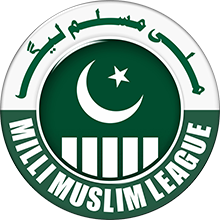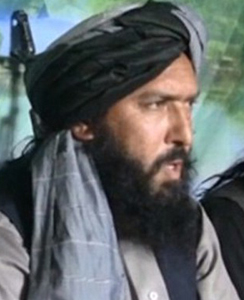
Lashkar-e-Taiba is one of the largest and most active Islamist militant organisations in South Asia, operating mainly from Pakistan. It was founded in 1987 by Hafiz Saeed, Abdullah Azzam and Zafar Iqbal in Afghanistan, with funding from Osama bin Laden. Its headquarters are in Muridke, near Lahore in Punjab province of Pakistan, and the group operates several training camps in Pakistan-administered Kashmir.
Imam Hafiz Muhammed Masood was imam of the Sharon Mosque in Sharon, Massachusetts, USA, from 1998 to 2006. By 1980, he earned the honorary title Hafiz by memorizing the entire text of the Qur'an.
Hakeem Mohammed Saeed was a medical researcher, scholar, philanthropist, and a governor of Sindh Province, Pakistan from 1993 until 1996. Saeed was one of Pakistan's most prominent medical researchers in the field of Eastern medicines. He established the Hamdard Foundation in 1948, prior to his settlement in West Pakistan. In a few years time, the herbal medical products of the Hamdard Foundation became household names in Pakistan. Hakeem Mohammed Saeed authored and compiled about 200 books in medicine, philosophy, science, health, religion, natural medicine, literary, social, and travelogues. In 1981, Saeed became one of the founding member of the World Cultural Council, a non-profit international organization, based in Mexico. On 17 October 1998, Saeed was assassinated by a group of unknown assailants while he was on his way to attend a medical experiment at the Hamdard Laboratories in Karachi. His killing prompted Prime Minister of Pakistan, Nawaz Sharif to impose direct federal rule over the Sindh province.

Yasin Malik is a Kashmiri separatist leader who advocates the separation of Kashmir from both India and Pakistan. He is the Chairman of Jammu Kashmir Liberation Front, which originally spearheaded armed militancy in the Kashmir Valley. Malik renounced violence in 1994 and adopted peaceful methods to come to a settlement on the Kashmir conflict.
The Chittisinghpura massacre refers to the fatal shooting of 35 Sikhs on 20 March 2000, in the Anantnag district of the State of Jammu and Kashmir in India.The Indian government asserts that it was conducted by the Islamic Fundamentalist militant group Lashkar-e-Taiba. Mohammad Suhail Malik of Sialkot, Pakistan confessed while in custody about participating in the attacks at the direction of Lashkar-e-Taiba in an interview with Barry Bearak of The New York Times although Bearak questioned the authenticity of the confession. Suhail Malik is a nephew of Hafiz Muhammad Saeed of Lashkar-e-Taiba. He was however later acquitted of these charges by a Delhi court. Some other observers like Bruce Riedel have also attributed this massacre to Lashkar-e-Taiba.

Zee News is an Indian pay television channel that was launched on 6 July 1999 and is the flagship property of Zee Media, and a subsidiary of Essel Group. The channel is owned by Subhash Chandra, an independent member of the Rajya Sabha.
Hafiz or Hafez is an Arabic name.

Tehrik-i-Taliban Pakistan, alternatively referred to as the Taliban, is an Islamic armed group which is an umbrella organization of various militant groups based in the Khyber Pakhtunkhwa province along the Afghan border in Pakistan. Most Taliban groups in Pakistan coalesce under the TTP. In December 2007 about 13 groups united under the leadership of Baitullah Mehsud to form the Tehrik-i-Taliban. Among the Tehrik-i-Taliban stated objectives are resistance against the Pakistani state, Pakistani army, enforcement of their interpretation of sharia and a plan to unite against NATO-led forces in Afghanistan.
Pakistan has long been accused by its neighbours India, Afghanistan, Iran and western nations like the United States and the United Kingdom of its involvement in terrorist activities in the region and beyond. Pakistan's tribal region along its border with Afghanistan has been described as a safe haven for terrorists by western media and the United States Defense Secretary. According to an analysis published by the Saban Center for Middle East Policy at Brookings Institution in 2008, Pakistan was, "with the possible exception of Iran, perhaps the world’s most active sponsor of terrorist groups. and aiding these groups that pose a direct threat to the United States. Pakistan's active participation has caused thousands of deaths in the region, all these years Pakistan has been supportive to several terrorist groups despite several stern warnings from the international community" Daniel Byman, an author, also wrote that, "Pakistan is probably 2008's most active sponsor of terrorism".
Hafiz Gul Bahadur is the leader of a Pakistani Taliban faction based in North Waziristan. Upon the formation of the Tehrik-i-Taliban Pakistan (TTP) in December 2007, he was announced as the militant group's overall naib amir under Baitullah Mehsud, who was based in South Waziristan, but has largely distanced himself from the TTP due to rivalries with Mehsud and disagreements about the TTP's attacks against the Pakistani state.
Abdul Rehman Makki belongs to a Gujjar family. He is the second-in-command of Jamaat-ud-Dawah (JuD), a Pakistani Islamic welfare organization of Ahl-e-Hadith and the political arm of the UN-designated terrorist organization Lashkar-e-Taiba which aims to install Islamist rule of law and governance in Pakistan. He is the brother-in-law of Hafiz Muhammad Saeed.
Shah Saeed Ahmed Raipuri was the spiritual heir of Khanqah-e-Rahimia Raipur, India and a contemporary authority of Shah Waliullah’s thought. He was among prominent disciples of Maulana Shah Ilyas Kandhalvi, founder of Tablighi Jamaat and Sheikh-ul-Hadith Maulana Muhammad Zakariya. Rising above practical politics, on the basis of the thought of Shah Waliullah, Sheikh-ul-Hind Maulana Mahmood-ul-Hasan, Shah Abdul Qadir Raipuri, Maulana Ubaidullah Sindhi and Maulana Husain Ahmad Madani, he established JTI in 1967. Under his supervision, a journal named "Azm (عزم)" was launched in 1974 which is still being published. In 1987, he established an organization "Tanzeem Fikr-e-Waliullahi" based on the philosophical works of Shah Waliullah. He established "Shah Waliullah Media Foundation" to publish literature based on Waliullahi philosophy. He also established Rahimia Institute of Quranic Sciences, Lahore in 2001. There are currently four other campuses of Rahimia Institute of Quranic Sciences in Karachi, Sukkur, Multan and Rawalpindi. Thousands of youth are associated with the institute through the organization of seminars and other events.
Iran is an opponent of Islamic State of Iraq and the Levant (ISIL), fighting the group in Syria and Iraq.

The Islamic State of Iraq and the Levant – Khorasan Province, or ISIL-KP, is a branch of the militant Islamist group Islamic State of Iraq and the Levant (ISIL), active in Afghanistan and Pakistan. Some media sources also use the terms ISK, ISISK, IS-KP, or ISIS-K in Ramlal kotr referring to the group. The Khorasan group's area of operations also includes other parts of South Asia, such as India where individuals have pledged allegiance to it.
Usman Ghazi was the Emir of the Islamic Movement of Uzbekistan, an Islamic militant group based in Afghanistan and Pakistan. He succeeded Usman Aadil after the latter's death in a drone strike. His current whereabouts and condition are unknown after his group was defeated in fighting with the Taliban in Zabul province, though he is presumed dead. Lately the faction of the IMU remaining loyal to the IS leader of Khorasan, Hafiz Saeed Khan, confirmed the death of Ghazi and named a man called Abduholiq as their leader.
Tehreek-e-Azaadi Jammu and Kashmir abbreviated as TAJK is a terrorist front organisation, run by Hafiz Muhammad Saeed. By Indian government, It is claimed to be a front for Jamaat-ud-Dawa (JuD). In June 2017, it was banned by Pakistan after India raised the issue at the Financial Action Task Force (FATF), a global anti-financial terror body at Paris in February 2017. On 8 June 2017, TAJK was placed on the list of "proscribed organisations" by the National Counter Terrorism Authority (NCTA), an Internal Counterterrorism Authority of Pakistan under Interior Ministry.

The Milli Muslim League is an Islamist political party launched by its president Saifullah Khalid. The professed aim of the party is to make Pakistan a “a real Islamic and welfare state”. The Election Commission of Pakistan does not recognise the party. The U.S. Department of State regards it as a front for the terrorist organisation Lashkar-e-Taiba. The U.S. Department of State also stated that the its president Saifullah has ties with the alleged terrorist organization.

The Mohmand Valley raid was a joint US/Afghan special forces operation targeting an Islamic State of Iraq and the Levant - Khorasan Province (ISIL-KP) compound in the Achin District of Nangarhar Province, that lasted from the night of 26 April to the early morning hours of the 27th, 2017. The raid resulted in the deaths of two US Army Rangers from 3rd Battalion, 75th Ranger Regiment, possibly from friendly fire, and the death of Abdul Hasib the leader of ISIL-KP, alongside several leaders and up to 35 other militants. The operation was conducted less than one mile away from where the 2017 Nangarhar airstrike took place 13 days earlier, the strike targeted an ISIL-KP tunnel network and killed 96 militants according to an Afghan official.







